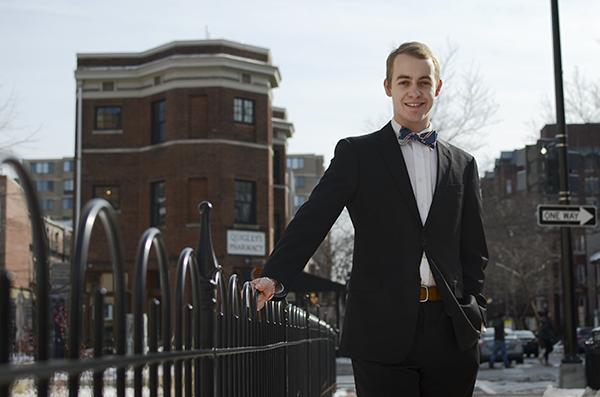Updated: Feb. 23, 2015 at 2:09 p.m.
A sophomore who has served as a member of the Student Association’s executive cabinet for the past year announced his campaign for executive vice president Monday, with a focus on expanding amnesty for alcohol violations.
Spencer Perry, the SA’s vice president for judicial and legislative affairs, said he would work with administrators to make GW’s amnesty policy cover an unlimited number of incidents. Students currently are only granted amnesty for one incident, which Perry said can discourage some students from calling medical services for a friend in need.
“There’s a huge deterrent to calling EMeRG and being like, ‘Hey, I need help for my friend,’ because there’s a chance that your friend might get suspended or expelled,” he said.
He said most other universities already offer full amnesty to students who are treated for alcohol or drug abuse, and a policy change would put GW in line with its peer schools.
Perry said his campaign will also concentrate on the University Police Department’s jurisdiction, which GW has tried to expand in the past. He would work to limit the police force’s powers and model the department after Georgetown University’s, where officers can patrol off-campus areas but cannot enforce school regulations.
He said current jurisdiction policies are unclear, which can lead to confusion for both students and UPD. Campus police changed their off-campus policy two years ago after multiple officers were disciplined for acting outside campus boundaries.
“The University right now has no special police powers off-campus other than what’s allocated by the D.C. government already,” Perry said. “We can find a comprisable solution that can both satisfy the police department unions as well as the University, and the D.C. government as well.”
Perry said he will also look to improve sexual assault prevention policies. He said he has already worked as a member of Kappa Sigma fraternity and the SA to push for mandatory sexual assault prevention training for students.
“Despite a lot of the progress that’s been done, there’s still more to be done,” he said. “I think that if we continue fighting for this issue, continue the momentum, I think we can become one of the premiere universities when it comes to the issue of sexual assault.”
He said he would use the Students Against Sexual Assault training model, where small groups of students and organizations review University resources and policies on sexual assault.
He said he would encourage University officials to lead the sessions because it would give a sense of authority to the trainings, but he would still like to include a peer component. He added that he was still determining details, including how each student would receive training.
“I feel the best model for combating sexual assault is making sure people are aware,” said Perry, who is a member of SASA.
Perry is already an active member of the executive board of several student organizations, including Allied in Pride, GW College Democrats, GW Student Global AIDS Campaign and Voices for Choices. He was also the community relations director of the Interfraternity Council last year.
Perry’s work with LGBT issues began in his home. Two years ago, the Supreme Court ruled in favor of his mothers’ landmark case, Hollingsworth v. Perry, striking down California’s Proposition 8.
Perry, a political science and economics double major, participated in Model UN and speech and debate in high school. He said those organizations gave him experience in parliamentary procedure, the same set of rules used in the SA Senate. As executive vice president, he would lead the senate.
He said his work with student organizations has helped him become more aware of the issues they face, including obtaining funding from the SA’s finance committee, and he would promote those issues as executive vice president.
“The best ways to advance student organization goals aren’t just the issues themselves,” Perry said. “It’s also getting student organizations tools to actually make that happen.”
This post was updated to reflect the following correction:
The Hatchet incorrectly reported the name of one of GW’s LGBT advocacy groups. It is called Allied in Pride, not Allied for Pride. We regret this error.







